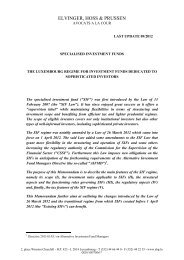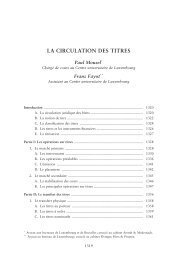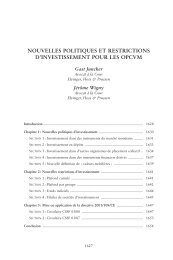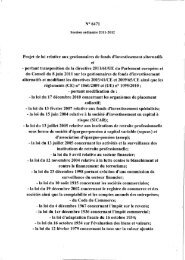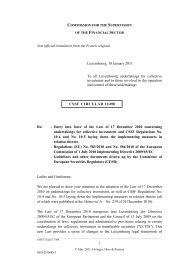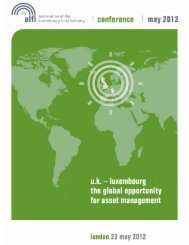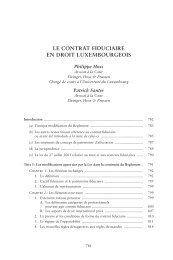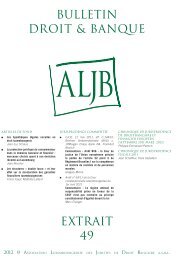1. Introduction - Elvinger, Hoss & Prussen
1. Introduction - Elvinger, Hoss & Prussen
1. Introduction - Elvinger, Hoss & Prussen
- No tags were found...
Create successful ePaper yourself
Turn your PDF publications into a flip-book with our unique Google optimized e-Paper software.
LUXEMBOURGindicated above, a financial participation cannot be amortised, which is a disadvantageof share deals compared to asset deals.Another disadvantage of asset deals may be the relatively high Luxembourgregistration duty applicable on the disposal of certain assets (essentially realestate) where registration is mandatory (see section 2.6 above).A claw-back may exist in a share deal if the target was part of a tax consolidationin the past. If the target is sold by its parent within five years of the beginningof the tax consolidation, the tax consolidation will be retroactivelycancelled, and all benefits which the target and its former parent have claimed inthe past as a result of the consolidation will be lost (see section 2.9).3.3. Acquisition financingIf the buyer uses a Luxembourg company for the purpose of the acquisition, itmay finance this Luxembourg company with significant indebtedness, giventhe generous Luxembourg thin capitalisation rules (see section 2.7 above). TheLuxembourg acquisition company may then be tax consolidated with a domestictarget (see section 2.9), so that interest deductions at the level of the parentmay offset the profits of the subsidiary. In this respect, it has to be borne inmind that the parent is not allowed to deduct interest payments in relation to aparticipation up to the amount of tax-exempt dividends generated by this participationin the same fiscal year (even though the formulation of the law hasbeen modified in this respect under a recent legislative change, the governmentalcommentary has specified that such change is not in substance but only tofollow the letter of Directive 90/435/EEC) (see section 2.11 above). Therefore,the leveraging of the acquisition company may prove difficult, as the acquisitioncompany usually has to rely on dividend payments made by the subsidiaryto serve interest on the financing received and reimburse the principal of itsindebtedness.It is debatable whether this restriction for the deduction of interest paymentshas to be applied if the distributing subsidiary forms, together with its parententity, a tax consolidation. Indeed, in a tax consolidation, all accounting movementswhich would result either in a double taxation or a double deduction andwhich would not apply to a single payer have to be adjusted (grand-ducal decreeof 1 July 1981 and LIR circular letter 164 bis/1 of 27 September 2004). The currentposition of the Luxembourg tax administration appears to be that dividendincome received by the parent is treated as exempt income under the dividendsubstantial participation exemption as if the tax consolidation did not exist. Thededuction by the parent of related financing costs is then refused (see 2.7). Thisposition defeats the main principle of a tax consolidation which should result inthe consolidated subsidiaries being considered as branches of the parent. Dividendpayments between consolidated subsidiaries and the parent should thereforebe disregarded for purposes of determining the net profit of the tax group andthere should accordingly be full deductibility of financing costs. By comparison,in an asset deal, if a Luxembourg company were set up to acquire the assets ofanother business, the Luxembourg company would be authorised to deduct interestexpenses on the financing received against trading income of the acquiredbusiness.454



